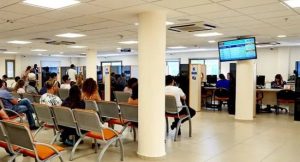In the absence of a suitable response, we might find ourselves on the “day after” with a smaller number of unemployed persons but with many more poor and deeper poverty
The government corona aid package aims to “restart the market.” It focuses on saving jobs and businesses, and on compensation for the losses of employees, self-employed persons and businesses. However, a large segment of the Israeli public — those working on the margins of the labor market – have nothing to gain from the plan.
Poor and near-poor households, constituting a quarter of Israeli households, bear the brunt of the economic shutdown along with many others who are currently falling into poverty. The latter include recipients of social security old age or disability allowances, persons living in public housing and subsidized rentals, young adults and others employed in temporary jobs with no work continuity or pay slips. Examples also include “gig employees” and precarious workers such as couriers, hourly workers, waiters and others who do not qualify for unemployment compensation.
In the midst of the socio-economic crisis caused by the corona virus and the shutdown, the aid package does not offer the necessary increase in social service budgets. Many social workers and other welfare professionals were sent home on unpaid leave, and the system suffers from a shortage of personnel.
The Education Ministry boasts about the long-distance learning programs that are available for one million students. Yet nothing was done for about 1.4 million other students who have no access to a computer or a cell-phone package in their homes, and they have had to stop learning. Even before the virus, the educational gaps between the haves and have-nots were wide; the long-distance learning program will expand them.
There is no guarantee that people living in public housing and subsidized rentals will be able to extend their leases. And Israel is yet to follow the example of the UK and temporarily prohibit ousting renters, or putting a provisional stop to all debt collecting processes, a step taken in other countries.
That said, credit is due to the CEO of the National Insurance Institute who called for the issuance of a temporary order that would allow a person to receive a double allowance (which in normal times is impossible), thus protecting, among others, single parents sent home on leave without pay, who would otherwise lose part of their child-support payments. The CEO also noted the need to raise income maintenance allowances, which are very low, or to give beneficiaries a lump sum payment to tide them over the corona crisis. The current public discourse is about compensation to employees, self-employed persons and businesses, but it ignores the question of the suitability of the social welfare apparatus to present- day needs.
Many countries have taken an expansionist position in line with OECD recommendations: income support or one-time awards to persons not eligible for unemployment compensation, compensation for reduction to part-time work, suspension of the qualification period for unemployment compensation, paid leave for parents and particularly for mothers unable to work because of the shutdown of the education system.
Compared to the majority of developed countries, the rate of poverty and extent of inequality in Israel were high even before the COVID-19 crisis. In the absence of a suitable response, we might find ourselves on the “day after” with a smaller number of unemployed persons but with many more poor and deeper poverty.
Published in Hebrew in the economic newspaper, Globes, April 6, 2020






